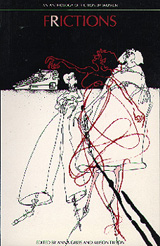
Frictions is an anthology of writing by Australian women, originally published in 1982 in response to the editors' belief that women were under‒represented in traditional anthologies. "We wish to do more than help redress a balance," they say in their introduction, "we want to upset the economy".
This is certainly no traditional collection. There is writing here from 23 women (all new to me - so what a shame there's no biographical information!) and it comes in many shapes and sizes; there are a couple of conventional short stories, but there is also poetry, monologues and a lot of pieces that I couldn't put a name to in terms of genre. Many of these fictions are extremely short, and I often had the feeling that I was being given a privileged look into a writer's notebook (one piece is even called "An Unfinished Story"). Another common thread is that many of the pieces are knowingly about the act of writing, with many also acknowledging the presence of the reader.
One of my favourite pieces is Elizabeth Jolley's "Night Report", daily reports left for each other over several weeks by the night sister and the matron of a nursing home; I loved the way the pretence of propriety is maintained with the insistence on the reports, which only serve to make clear that some very untoward things are going on in the home —and surreal comments from the matron like "It is unfortunate that one of the patients is your mother please will you refer to her in this report book as Mrs. Morgan which is her correct name. Please bring your own knife it is simply not possible for me to provide knives" appealed to my sense of humour. What I most enjoyed about this piece, though (and I could say the same for others in the collection), was the sense that the writer was enjoying herself enormously.
The editors didn't want to compile an anthology in which all the pieces nestled harmoniously alongside each
other; they set out to create tension—hence the title of the collection—and in that they succeeded.
They didn't solicit "feminist writing" because they didn't want to rule out writers who didn't apply that label
to their work, but feminist writing is what they wanted, and some of it is particularly strident. I wonder
what the result would be now, if they set out to produce the same anthology over 25 years later?

Spinifex, paperback, 9780908205028